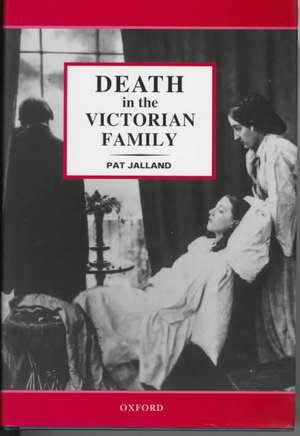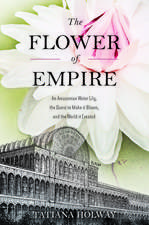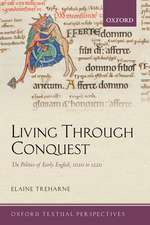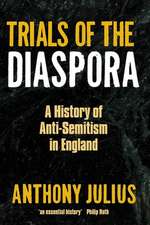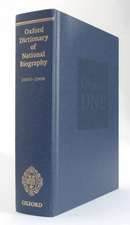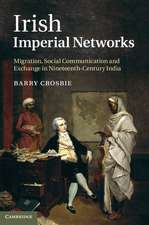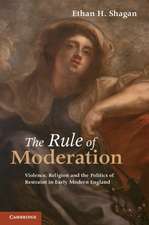Death in the Victorian Family
Autor Pat Jallanden Limba Engleză Hardback – 7 noi 1996
| Toate formatele și edițiile | Preț | Express |
|---|---|---|
| Paperback (1) | 430.06 lei 31-37 zile | |
| Oxford University Press – 4 noi 1999 | 430.06 lei 31-37 zile | |
| Hardback (1) | 357.61 lei 31-37 zile | |
| OUP OXFORD – 7 noi 1996 | 357.61 lei 31-37 zile |
Preț: 357.61 lei
Preț vechi: 422.10 lei
-15% Nou
Puncte Express: 536
Preț estimativ în valută:
68.44€ • 71.02$ • 57.20£
68.44€ • 71.02$ • 57.20£
Carte tipărită la comandă
Livrare economică 05-11 martie
Preluare comenzi: 021 569.72.76
Specificații
ISBN-13: 9780198201885
ISBN-10: 0198201885
Pagini: 476
Ilustrații: 16 pp plates
Dimensiuni: 163 x 242 x 32 mm
Greutate: 0.93 kg
Editura: OUP OXFORD
Colecția OUP Oxford
Locul publicării:Oxford, United Kingdom
ISBN-10: 0198201885
Pagini: 476
Ilustrații: 16 pp plates
Dimensiuni: 163 x 242 x 32 mm
Greutate: 0.93 kg
Editura: OUP OXFORD
Colecția OUP Oxford
Locul publicării:Oxford, United Kingdom
Recenzii
This is a fascinating book, considering a very interesting topic at what ... is the period of our history which it finds its most enlightening form. Its strength lies in its detail and the picture of individual lives that it creates. This is a welcome addition to the history of the period.
Pat Jalland's research is impressive, drawing on a vast range of resources taken from the archives of 55 Victorian and Edwardian families.
Jalland s exploration of death and bereavement has broken new ground in the study of death.
The value of Jalland s study, however, lies in the fact that she has moved the discussion of death beyond the boundaries of funeral custom (and expense) and the cemetry to consider grief as a pervasive experience which often stretched from the sickness of the dying to long after their burial had taken place.
Jalland s text is perhaps exceptional in her attempt to gauge the disparate, -experimental- aspect of death and bereavement prior to the privatization of death during the twentieth century.
This is by far the best account we have of the elite Victorian attitudes toward dying and death ... a book rich in telling detail, sensitive to its subjects, a very important contribution to a growing literature on death and dying ... this fine book provides a vivid portrait of concepts of dying in another, very different era.
Jalland offers a revealing picture of the process and perception of death in middle-class Victorian society ... This book deserves a wide audience for its thoughtful and thoroughly professional approach to a topic of vital contemporary concern and interest.
the power of her book lies simply in its detail - in this case the intelligent use of a mass of Victorian family papers and the individual histories they throw up...This is an excellent book, learned, wide-ranging
Her book is the first really to grapple with the connection between personal behaviour and public precept in this area
cool and sombre study
excellent book...Jalland's book is a timely reminder of the pleasures of empirical history...Her explanation of the emotional and psychological comforts of Evangelical Protestantism is particularly enlightening. A way of worship which has always seemed stodgy, florid and smug becomes in Jalland's re-telling, a joyous means of dealing with life's great mystery.
painstaking and illuminating style ... Death, as a modern academic subject, is still young and Death in the Victorian Family is an excellent addition.
Pat Jalland has explored family archives and relevant secondary materials, and put her findings together in a book notable for its comprehensiveness and unusual neatness. This is a masterly monograph, evidence that however assiduously we dig into the lives of the Victorians, there is always more material to be unearthed.
Jalland ranges impressively: Victorian doctors and nurses, ideas on palliative care and competing versions of heaven, among other topics, are touched on.
This is an outstanding work, scholarly and yet very readable, even gripping, based on the most fascinating of original documents.
By asking about the intimate experience of dying she draws neglected material from an imposing collection of relatively well known papers.
she draws neglected material from an imposing collection of relatively well known papers ... Pat Jalland ends with some fascinaitng comments about spiritualism, partly popularised by the First World War.
Pat Jalland's research is impressive, drawing on a vast range of resources taken from the archives of 55 Victorian and Edwardian families.
Jalland s exploration of death and bereavement has broken new ground in the study of death.
The value of Jalland s study, however, lies in the fact that she has moved the discussion of death beyond the boundaries of funeral custom (and expense) and the cemetry to consider grief as a pervasive experience which often stretched from the sickness of the dying to long after their burial had taken place.
Jalland s text is perhaps exceptional in her attempt to gauge the disparate, -experimental- aspect of death and bereavement prior to the privatization of death during the twentieth century.
This is by far the best account we have of the elite Victorian attitudes toward dying and death ... a book rich in telling detail, sensitive to its subjects, a very important contribution to a growing literature on death and dying ... this fine book provides a vivid portrait of concepts of dying in another, very different era.
Jalland offers a revealing picture of the process and perception of death in middle-class Victorian society ... This book deserves a wide audience for its thoughtful and thoroughly professional approach to a topic of vital contemporary concern and interest.
the power of her book lies simply in its detail - in this case the intelligent use of a mass of Victorian family papers and the individual histories they throw up...This is an excellent book, learned, wide-ranging
Her book is the first really to grapple with the connection between personal behaviour and public precept in this area
cool and sombre study
excellent book...Jalland's book is a timely reminder of the pleasures of empirical history...Her explanation of the emotional and psychological comforts of Evangelical Protestantism is particularly enlightening. A way of worship which has always seemed stodgy, florid and smug becomes in Jalland's re-telling, a joyous means of dealing with life's great mystery.
painstaking and illuminating style ... Death, as a modern academic subject, is still young and Death in the Victorian Family is an excellent addition.
Pat Jalland has explored family archives and relevant secondary materials, and put her findings together in a book notable for its comprehensiveness and unusual neatness. This is a masterly monograph, evidence that however assiduously we dig into the lives of the Victorians, there is always more material to be unearthed.
Jalland ranges impressively: Victorian doctors and nurses, ideas on palliative care and competing versions of heaven, among other topics, are touched on.
This is an outstanding work, scholarly and yet very readable, even gripping, based on the most fascinating of original documents.
By asking about the intimate experience of dying she draws neglected material from an imposing collection of relatively well known papers.
she draws neglected material from an imposing collection of relatively well known papers ... Pat Jalland ends with some fascinaitng comments about spiritualism, partly popularised by the First World War.
Notă biografică
Pat Jalland is Associate Professor of History at Murdoch University, WA. From 27 January 1997 she will be Professor of History at the Institute of Advanced Studies, Australian National University. Her books include Women, Marriage, and Politics 1860-1914, which won the non-fiction prize in the 1987 Western Australia Week Literary Awards.
